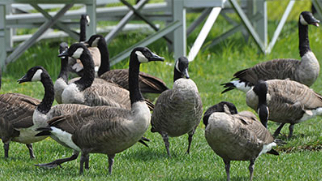
MONTVALE—Visitors to local athletic fields and parks can anticipate seeing fewer geese — and less geese droppings — over the upcoming weekends thanks to a nearly $4,000 “geese harassment” amendment that the Borough Council approved and added to its yearly animal control services contract.
On March 29, the council approved a nine-month, $400 per month contract with Tyco Animal Control Service, Ho-Ho-Kus, for weekend geese control services April 1–Dec. 31.
In addition, the council approved its annual animal control services contract with Tyco for $11,040. The annual Tyco contract runs Jan. 1–Dec. 31, 2022.
Under its regular contract, Tyco also conducts geese control measures Monday to Friday.
Recently, the borough terminated a prior contractor who was hired to help minimize the presence and impacts of geese in borough parks and fields.
“Tyco will perform additional harassment of geese on Saturdays and Sundays at Borough designated parks using dogs and/or disturbing noises. Although the use of dogs has proven very effective in the control of geese, there is no guarantee that it will eliminate all geese from coming into the Borough park areas,” said the Tyco contract amendment.
Either party, Tyco or the borough, can discontinue the weekend geese contract with 30 days written notice, states the proposal.
“It is necessary for the borough to engage a vendor to provide geese control services on-Saturdays and Sundays in order to ensure that borough parks and fields are kept as free from geese as possible to protect the health, safety and welfare of the public,” reads Resolution 78-2022.
‘Varying health risks’
According to Columbia University, goose droppings typically contain several pathogens, which might come into contact with people “and pose varying health risks depending on the person.”
Columbia said common parasites within goose poop are cryptosporidium and giardia. Common bacteria include methicillin-resistant staphylococcus aureus (MRSA), Escherichia coli (E. coli), coliform, and campylobacter.
“These parasites and bacteria might come into contact with humans through direct or indirect contact with geese feces and through consumption of meat from infected animals,” the school says.
It adds that “The elderly, children, people who are immunocompromised, have gastrointestinal issues, or are pregnant or breastfeeding may be particularly susceptible to health risks posed by these pathogens. As such, it’s safest practice for people to avoid geese feces altogether to minimize their health risks.”
Carol Tyler, a Tyco animal control officer, said that they currently work to chase geese off several fields and other locations in town, including Huff Park, Memorial Field Athletic Complex, Fieldstone Athletic Complex, and Chestnut Ridge (La Trenta) Athletic Complex, and the lawns near Borough Hall.
She said that generally they use dogs specially trained to chase after the geese — a federally protected species — but not hurt them to scare the geese off large recreational fields and green spaces.
Also, she said occasionally they mix in loud noises where appropriate to scare off the geese. She said often the geese on certain fields take off into the air before their dogs even begin to chase them.
She said by making the geese fearful of the dogs and loud noise, the geese will not become so-called resident geese, and become comfortable with their surroundings and wish to return there to give birth and raise goslings.
She said Tyco was not seeing “a big problem” with droppings but that regular “agitation” of the geese seven days per week made it less likely they would continue to return to certain fields to defecate or give birth.
She said the coyote silhouettes often used are not effective as they do not frighten or force the geese to move. But when combined with dogs chasing after the geese regularly, this unsettles the geese and prevents them from acclimating to one area. Then the silhouettes may have more impact or a chance to scare off the geese from frequenting certain areas, she said.
Other services provided under its annual Tyco contract include: impounding of strays; quick response to rescues and to remove sick, dangerous, diseased or injured wildlife; responding to emergency calls on public property, private property calls for a fee, responding to emergency calls 7 p.m. to 8 a.m. at $60 per call; deer carcass pickup at $60 per deer; and free humane trapping of stray and wild animals on public property.
In the event where animals must be trapped on private property, an additional fee of $60 for trap rental and $60 service and removal fee must be paid in advance by the property owner. Removal of visible wildlife at a private home will be available at a fee of $60 payable by the homeowner, states the contract.
Tyco’s contract notes that trapping services are only offered Monday to Friday, not on weekends.
